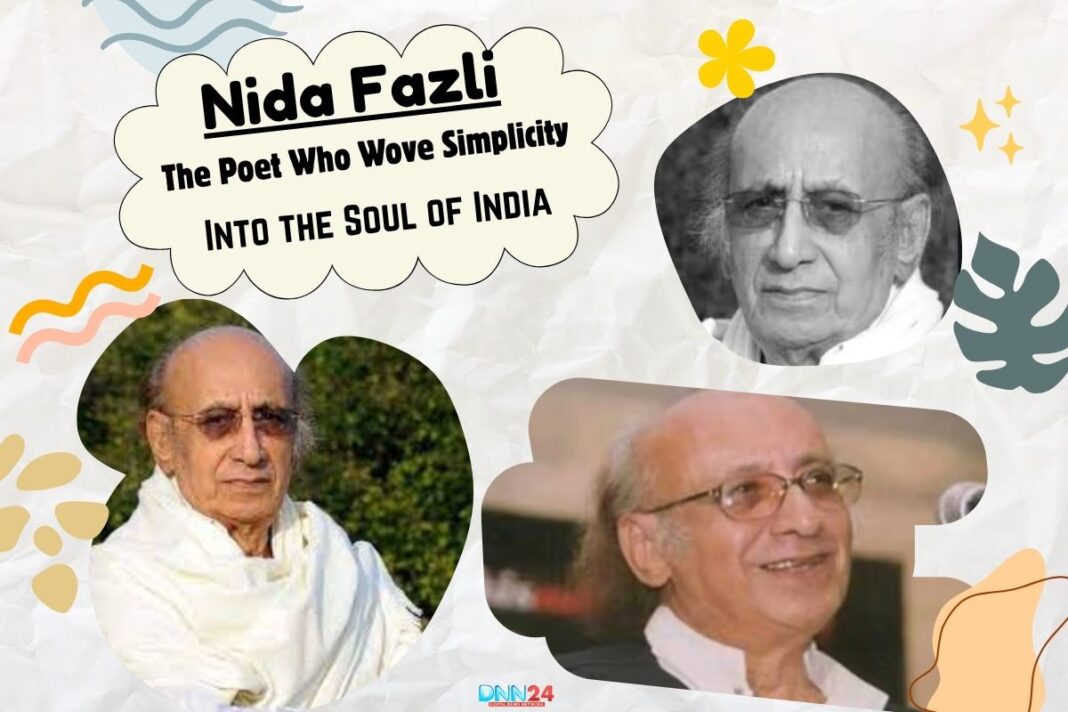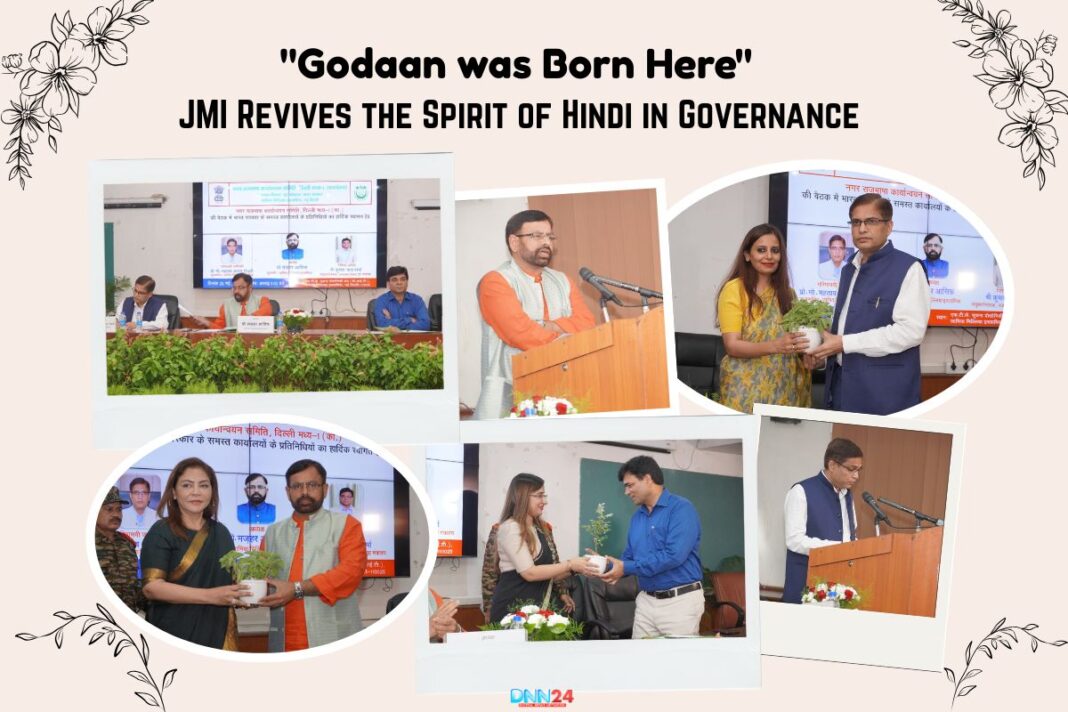Born on October 12, 1938, in Delhi, Nida Fazli was Muqtida Hasan in a household where poetry flowed naturally like air. Words surrounded young Nida; his father, Murtaza Hasan, was also a poet. Childhood for Nida was about listening to the lyrical recitations of his father and the soft rhythm of Gwalior, where he grew up, not just about games and laughing. Gwalior’s alleyways, the sounds of temple bells, and the soothing cry of the azaan mixed in his heart to create a poet who belonged to everyone rather than one group.
But life wasn’t always mild. His parents and siblings relocated to Pakistan, but Nida decided to remain in India alone and deliberately, breaking apart his family. His poems represented this quiet companion that became his suffering of separation. Even as a young man, he found peace in the lines of Surdas, understanding that poetry could cure hurts that words could not convey. The death of a beloved college friend, Miss Tandon, in an accident left him looking for consolation in poetry, but he found none that matched his sadness. This was when he determined to write in a language and manner that would touch every heart, not just the learned few.
Ghar se masjid hai bahut dur chalo yun kar len
Nida Fazli
kisi rote hue bachche ko hansaya jae
The Years Mumbai: Trials and Stardom
In 1964, Nida Fazli went to Mumbai, the city of dreams, with nothing but hope and a heart full of poetry. Though the city was large and apathetic, Nida’s words found their route. He began writing for periodicals like Dharmayug and Blitz, and soon, his simple but deep style gained the attention of filmmakers and poets alike.
Mumbai was not only a city for Nida; it was a muse. The masses, loneliness, and challenges of everyday life all formed poems in his poetry. He was routinely invited to mushairas, those mystical meetings when poets performed their masterpieces. Unlike others, Nida shunned heavy Persian vocabulary and rich imagery, adopting the vernacular of ordinary people instead. His poetry mirrors life—sometimes sweet, sometimes cruel, but always honest.
He also experienced criticism, notably when he authored articles in his book Mulaqatein criticising the prominent poets of his period. For a period, some boycotted him, yet his distinctive voice could not be suppressed. Filmmaker Kamal Amrohi saw his skill and offered him an opportunity to create songs for the film Razia Sultan, opening the doors of Bollywood for Nida.
Duniya jise kahte hain jadu ka khilauna hai
Nida Fazli
mil jae to miTTi hai kho jae to sona hai
achchha sa koi mausam tanha sa koi aalam
har waqt ka rona to be-kar ka rona hai
Kissey of Nida Fazli’s Life
Nida Fazli’s life was filled with untold stories—moments that formed his poems and spirit. One such narrative is about his visit to a temple as a young man. There, he heard a bhajan about Radha’s anguish, which struck him greatly. This event showed him that poetry is not about religion or language but about feeling.
Another lesser-known narrative is about his love for a college buddy, Miss Tandon. Her untimely death created a gap in his heart, and he recognised that Urdu poetry, as he understood it, did not have a verse to describe his sadness. This understanding prompted him to develop a new style that spoke of actual feelings and daily misery.
Nida was also a guy of bravery. When sectarian riots rocked Mumbai, he produced poetry that pleaded for peace and brotherhood, integrating the symbols of Krishna and Allah in a single verse. He never visited the funerals of his parents in Pakistan, a grief that tormented him and made its way into his poetry. His lyrics constantly questioned the barriers produced by politics and religion, pushing people to strive for compassion and humanity above all else.
Kabhi kisi ko mukammal jahan nahin milta
Nida Fazli
kahin zamin kahin aasman nahin milta
tamam shahr mein aisa nahin KHulus na ho
jahan umid ho is ki wahan nahin milta
Nida Fazli’s Nazm: The Heartbeat of Everyday Life
Nida Fazli was a master of the nazm—a kind of poetry that flows like a tale, free from the restraints of rhyme and meter. His nazms were not simply poetry; they were talks about existence itself. He wrote about love, sorrow, hope, and the tiny delights that make life wonderful. His words were simple, but their meaning was profound, affecting the hearts of everyone who read them.
One of his most famous nazms brilliantly encapsulates the core of everyday hardships and dreams: ” afar mein dhoop to hogi, jo chal sako to chalo; sabhi hain bheed mein, tum bhi nikal sako to chalo.”
His name typically talked of love—not the grandiose, larger-than-life love of movies, but the delicate, daily devotion that bonds people. He wrote of waiting for a loved one, the anguish of separation, and the delight of brief reunions. His poetry was beautiful, but it was also founded in reality, making it approachable to everybody.
Koshish bhi kar umid bhi rakh rasta bhi chun
Nida Fazli
phir is ke baad thoDa muqaddar talash kar
The Magic of Simplicity: Nida Fazli’s Style
What made Nida Fazli’s poetry stand out was its simplicity. He thought that poetry should be for everyone, not only for experts and intellectuals. He utilised regular language, portraying scenes of ordinary life in unusual ways. His poetry was like lovely chats, full of compassion and insight.
He took inspiration from the greats—Mir, Ghalib, Meera, Kabir—but gave their teachings a contemporary, approachable touch. He was inspired by Western authors like T.S. Eliot and Chekhov, mixing their thoughts with Indian reality. In every poem, he strove to bridge the gap between tradition and modernity, between the individual and society.
Kisi ke waste rahen kahan badalti hain
Nida Fazli
tum apne aap ko KHud hi badal sako to chalo
Romance in Nida Fazli’s Poetry: Love Beyond Words
Nida Fazli’slove poetry was not about lofty statements or unachievable ideals. It was about simple things—the touch of a hand, the desire in a gaze, and the quiet between two people who understood one another. His love poetry was packed with passion but never with excess.
He wrote about waiting for a lover, the sorrow of distance and the ecstasy of reunion. His comments were calm, like a gentle wind on a summer evening. He thought love was not about ownership but understanding and respect.
Safar mein dhoop to hogi jo chal sako to chalo
Nida Fazli
Sabhi hain bheed mein tum bhi nikal sako to chalo
Kisi ke waaste raahen kahaan badalti hain
Tum apne aap ko khud hi badal sako to chalo
His poems taught us that love is not necessarily about being together but about carrying someone in your heart, no matter where you are.
Nida Fazli’s Legacy: The Bridge of Words
Nida Fazli’s impact on Indian literature is significant. He created more than twenty volumes of poetry, multiple books, essays, and innumerable songs for films. His work Lafzon Ka Pul (The Bridge of Words) became renowned in India and Pakistan. He earned various prizes, including the Padma Shri and the Sahitya Akademi Award.
But his legacy is the bridge he built—with words—between people, faiths, and generations. He taught that poetry could be simple and deep, heal wounds, and bring people together. Even after his death in 2016, his poetry continues to inspire, soothe, and unify people throughout the globe.
Baat kam kijiye, zehānat ko chhupāe rahiye
Nida Fazli
Ajnabi shehar hai ye, dost banāe rahiye
Dushmani laakh sahi, khatm na kijiye rishtā
Dil mile ya na mile, haath milāe rahiye
Conclusion: The Eternal Song of Nida Fazli
Nida Fazli’s life was a journey through anguish, hope, loneliness, and love. He wrote for the average man, using simple words to communicate the deepest feelings. His poetry is like a gentle rain—soft, pleasant, and full of life. He showed us that poetry is not only about words; it is about emotions, about reaching out to another human being and saying, “Understand.”
His name, his Shayari, his songs—all are a tribute to the strength of simplicity and honesty. In a world of noise, Nida Ffazli’s poetry is a calm melody that stays in the heart, reminding us that we are never completely alone as long as we have words to give and feelings to experience.
Safar mein dhup to hogi jo chal sako to chalo
Nida Fazli
sabhi hain bhiD mein tum bhi nikal sako to chalo
kisi ke waste rahen kahan badalti hain
tum apne aap ko KHud hi badal sako to chalo
Let us go with Nida Fazli, via his words, towards a world where every heart discovers its poetry.
Also Read: Amir Khusrau: Poet, Mystic, Musician, and Cultural Icon
You can connect with DNN24 on Facebook, Twitter, and Instagram and subscribe to our YouTube channel.



